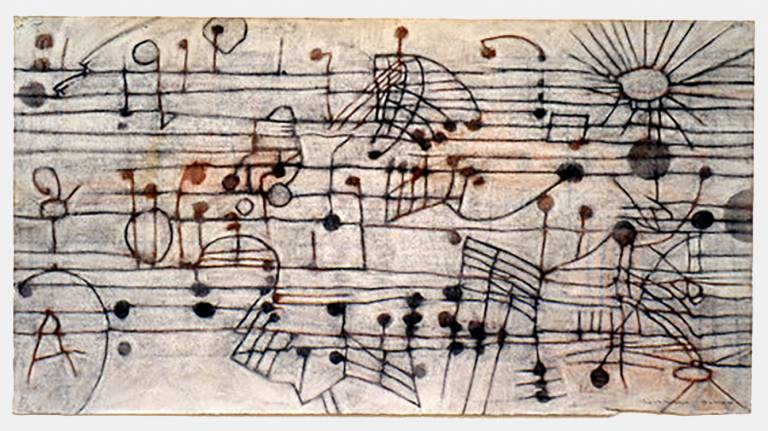MUSIC FUTURES/SONIC PASTS: IMAGINED INSTRUMENTS, IMAGINED MUSIC
30 October 2022, 2:00 pm–5:00 pm

PhD students Cathy Lucas and Elena Ktori collaborate with artists Dan Scott, and Tom Graham and Dave Graham (aka Ukkonen) to explore moments where speculative experiments with sound crossed paths with the histories of science. Compared by UCL staff members Dr Chiara Ambrosio (STS) and Dr Maria Kiladi (Department of Political Science).
Event Information
Open to
- All
Availability
- Yes
Cost
- £10.00
Organiser
-
Music Futures/Sonic Pasts
Location
-
Cafe OTO18-22 Ashwin StreetLondonE8 3DL
Part 1 – Seeing the Unhearable
Elena Ktori, Tom Graham, and Dave Graham
Experimental composers have often resorted to creating graphic scores to visualise music that is otherwise impossible to play. What motivates this desire to see representations of music that can never be heard? Can such scores be regarded as musical at all? What do they mean for the composers who create them? And what, if anything, do they mean to the audiences who can never hear them? Taking the works and notation of composer Daphne Oram as its cue, the performance piece “Seeing the Unhearable”, will probe the elusive, subversive, sometimes melancholic, and often mocking nature of graphic scores. Their relation to impossible music will be dissected and wholly embodied by an imaginative and slyly ironic combination of images, live music, and spoken word.
Part 2 – Imagined instruments: Alexander Bell’s speaking harp
Cathy Lucas and Dan Scott
Two years before submitting his telephone patent in 1876, Alexander Bell imagined a curious and quite different speech transmission machine. The speaking harp was made up of thousands of steel reeds fixed across a transmitter and a receiver that analysed and synthesised speech using musical tones. Cathy Lucas and Dan Scott tell this story of imagined voice synthesis using the sounds of the nineteenth-century acoustics laboratory. Just as sung vowels, tuning forks, organ tones and resonating strings spilled into the world of speech science, Cathy and Dan let their illustrative sounds diffuse impressionistically into music.
Participants:
CHIARA AMBROSIO
Chiara Ambrosio is Associate Professor of History and Philosophy of Science at UCL. She works on the relationships between art and science, from a historical and philosophical perspective. She has collaborated with the improvised opera company Impropera, for which she serves as historian and philosopher in residence, and with them she has founded MUSO, a co-production between UCL museums and collections, UCL STS and improvised opera.
MARIA KILADI
Maria Kiladi is a Research Fellow at STS, UCL, where she has been working on the history of eugenics, and personalized medicine. She is a historian of 20th Century British History with expertise in the British Labour Movement, Socialism and Communism during the 1920s and 1930s. Maria is an accomplished pianist with a strong music background, including a PhD in Music, an MA in Historical Musicology and a BMus in Performance composition.
DAN SCOTT
Dan Scott is an artist, musician and an associate lecturer at Royal Central School of Speech and Drama and Canterbury Christchurch University. Dan has a background in music and anthropology and his work explores socially-engaged approaches to sound and listening, methodologies for listening as an artistic practice within participatory settings, and histories of sound technology. He creates compositions, events and performances that explore sound's cultural and material resonances.
CATHY LUCAS
For this event, Cathy Lucas is wearing her PhD hat. Based in UCL’s STS, her research looks at instruments and techniques for electric tone production in the nineteenth century in various domains of science and technology and their connections to music. Cathy has also been active on London’s experimental scene for more than a decade, chiefly as band leader in art-pop group Vanishing Twin and founding member of minimal music collective School of Hypnosis.
ELENA KTORI
Elena Ktori is a PhD student at STS, UCL and the Science Museum. Her research focuses on the aesthetics of electronic music composer Daphne Oram, in particular the dialectic of sound and image as embodied by Oram’s unique graphic-sound system.
TOM GRAHAM
Tom Graham is a painter, graphic artist, film-maker, and novelist who is currently a PhD student at Birkbeck, University of London, where he is researching some of the more overlooked aspects of the social history of Satan.
DAVE GRAHAM
Dave Graham is a composer based in London. He achieved critical acclaim under the pseudonym Ukkonen for his “non-linear techno music”, and is currently working on film scores.
Image: ‘Last Notes from Endenich’ by Tom Phillips used with kind permission from the artist.
Please follow this FAQ link for more information. All our events are free but you can support the IAS here.
 Close
Close

